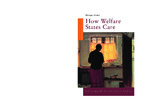How Welfare States Care
Culture, Gender and Parenting in Europe
Abstract
A social revolution has taken place in Europe. Women's employment patterns changed drastically the last decades. But they are still different across Europe. Welfare state scholars often presume that diversity and change in women's employment across Europe is based on financial (dis) incentive structures embedded in welfare states. This book shows, by in depth analyses of women's (and men's) employment and care patterns as well as child care services, taxation, leave schemes and social security in four different welfare states (the UK, the Netherlands, Denmark and Belgium) that this logic does not hold. A mother is not primarily the homo economicus welfare state scholars tend to presume. 'to work or to care 'is above all a moral predicament. What explains better the differences in Europe is to place care centrally and analyse welfare states as cultural agents. In the case of caring and paid employment, welfare states send culturally-defined moral images of good-enough caring in the form of ideals of care. An ideal of care implies a definition of what is good care and who gives it. These ideals of care are embedded in welfare states and their regulations, laws and implementation processes. Each welfare state promotes specific ideals of care. Cultural explanations downplay the role of the state too much. Culture, as is shown, is located within rather than outside the welfare state. The welfare state is not only a notary drawing contracts between the state and citizens or a merchant connecting supply and demand, but also a priest. This book shows, by studying care policy in welfare states, that social policy has an impact on women's and men's division of labour and care. But especially when welfare states are not seen as a financial structures only, but as cultural catalysts. In How Welfare States Care gaat Monique Kremer in op de verschillen in arbeidsdeelname van vrouwen in Denemarken, Engeland, België en Nederland. Vrouwen zijn dan wel in groten getale de arbeidsmarkt opgegaan, toch zijn er grote verschillen. In Denemarken werken moeders meer dan in Engeland en in Nederland inmiddels meer dan in België, maar dan wel in deeltijd. Vaak wordt gezegd dat verzorgingsstaten het verschil maken. Hoe meer en goedkoper er kinderopvang is, des te meer moeders werken. Hoe meer kostwinnersbeginselen in het belastingstelsels en sociale zekerheid, des te minder moeders werken. Na een analyse van sociale zekerheid, belastingen, verlofregelingen en kinderopvang in de vier landen blijkt deze logica niet helemaal te kloppen. Moeders zijn geen homo economicus maar een homo moralis en kiezen soms zelfs tegen hun economische belangen in. Moeders worden gedreven door een zorgideaal: het belangrijkste is dat er uitstekend voor de kinderen wordt gezorgd als ze werkt. Kremer toont overtuigend aan dat verschillende verzorgingsstaten verschillende idealen van zorg prediken. De culturele boodschap is belangrijker dan de financiële.
Keywords
public administration; geschiedenis; vrouwenstudies; bestuurskunde; women and education, research, related topics; history, geography, and auxiliary disciplinesDOI
10.5117/9789053569757ISBN
9789053569757OCN
231629359Publisher
Amsterdam University PressPublisher website
https://www.aup.nl/Publication date and place
2007Series
Changing Welfare States,Classification
History
Society and culture: general
Politics and government


 Download
Download